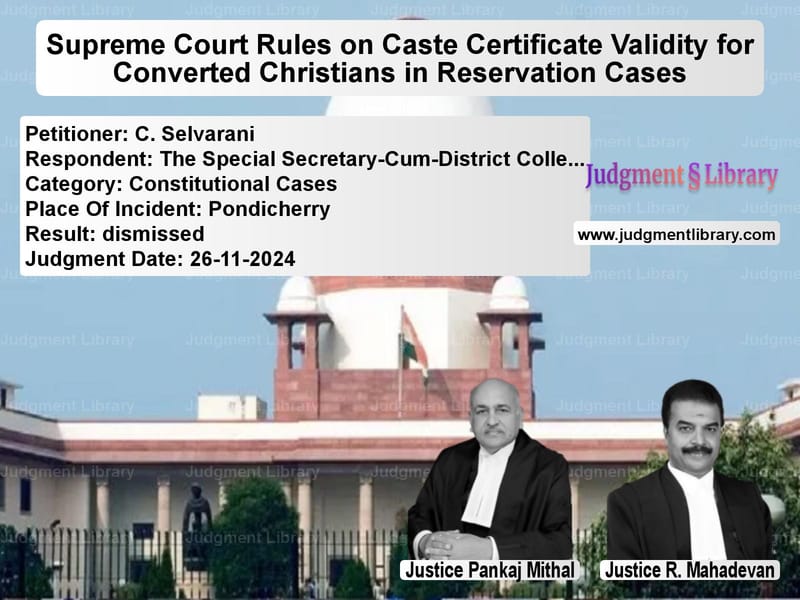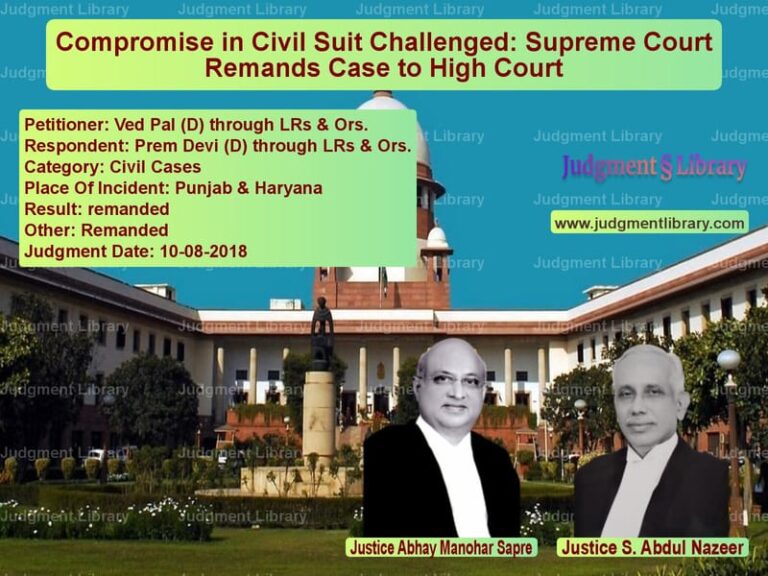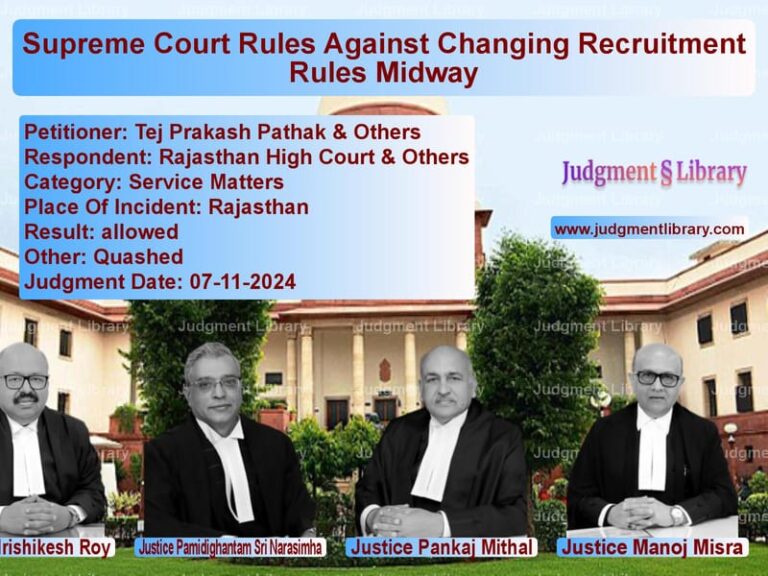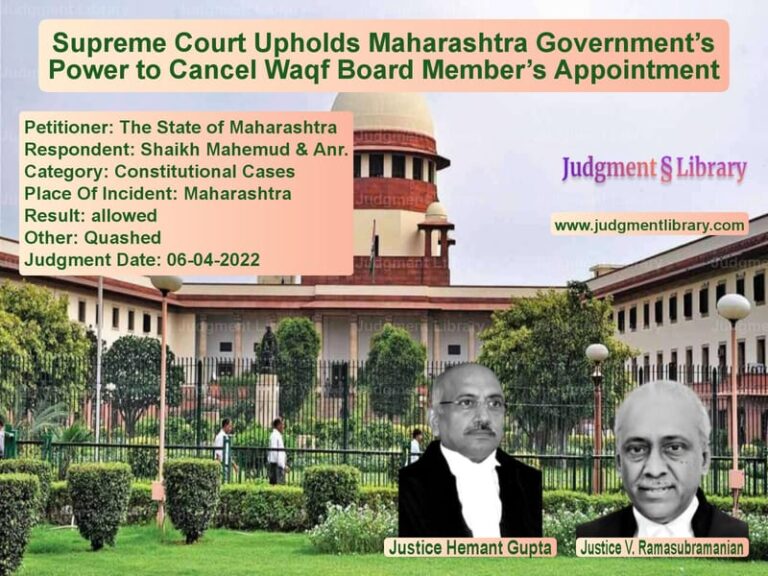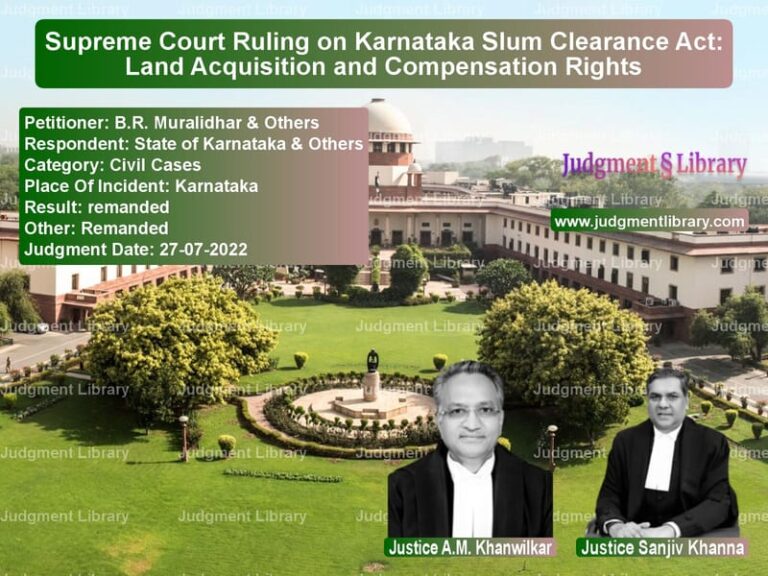Supreme Court Rules on Caste Certificate Validity for Converted Christians in Reservation Cases
The Supreme Court of India recently delivered a landmark ruling in the case of C. Selvarani vs. The Special Secretary-Cum-District Collector & Others, addressing the validity of caste certificates issued to individuals of Scheduled Caste origin who have converted to Christianity. The case specifically examined whether a converted Christian could claim Scheduled Caste (SC) status for the purpose of availing reservation benefits in government employment.
Background of the Case
The appellant, C. Selvarani, applied for the issuance of a Scheduled Caste community certificate under the Constitution (Pondicherry) Scheduled Castes Order, 1964. She contended that:
- She was born into a family where her father belonged to the Valluvan caste, recognized as a Scheduled Caste under the SC Order, 1964.
- Her mother was a Christian by birth, but after marriage, she allegedly converted to Hinduism.
- She identified herself as Hindu and claimed eligibility for SC status based on her lineage.
The authorities rejected her application on the ground that she was baptized as a Christian and did not profess Hinduism, Buddhism, or Sikhism, as required under the law.
Legal Issues Raised
- Whether the appellant, born to a Hindu Scheduled Caste father and a Christian mother, was entitled to a Scheduled Caste certificate.
- Whether a person baptized as a Christian could later reclaim Scheduled Caste status upon reconversion to Hinduism.
- Whether a government authority had the right to deny caste certificates based on religious conversion.
Arguments by the Petitioner
- The petitioner argued that caste is inherently assigned at birth and does not cease upon religious conversion.
- She contended that her mother had converted to Hinduism and that she herself had always practiced Hindu traditions, worshiped Hindu deities, and identified as Hindu.
- She relied on educational and government records where she had availed concessions under the Scheduled Caste category.
- She cited precedents where courts held that a person reconverting to Hinduism could regain their caste status if accepted by the community.
Arguments by the Respondent
- The government authorities submitted that the petitioner had undergone baptism as an infant and had never formally converted back to Hinduism.
- They cited a village administrative officer’s report, stating that she was an active member of the local Christian community and that her father was a converted Christian.
- The respondents contended that as per the law, only those who profess Hinduism, Sikhism, or Buddhism are eligible for Scheduled Caste status.
- They highlighted that her baptismal records, as well as testimonies from villagers, confirmed that she continued to practice Christianity.
Supreme Court’s Analysis
1. Religion and Caste Status
The Court reaffirmed that Scheduled Caste status is granted based on historical social discrimination and is linked to Hinduism, Sikhism, and Buddhism. The judgment stated:
“A person who ceases to profess Hinduism and converts to Christianity loses the constitutional benefits provided to Scheduled Castes.”
2. Burden of Proof for Reconversion
The Court emphasized that mere self-identification as a Hindu is insufficient. There must be clear evidence of reconversion and community acceptance. It ruled:
“A caste, once eclipsed upon conversion, can be revived only if there is an express reconversion and acceptance by the community.”
3. Legal Precedents on Caste and Conversion
The Court cited previous rulings where caste status was found to be inextricably linked to religious identity:
- In Soosai v. Union of India (1986), the Court held that Scheduled Caste benefits do not apply to Christians.
- In Kailash Sonkar v. Maya Devi (1984), it was ruled that reconversion to Hinduism could restore caste status only if the community accepted the individual.
- In Mohammad Sadique v. Darbara Singh Guru (2016), the Court stated that while religion can be changed, caste remains associated with birth.
4. Validity of the Baptismal Records
The Court found that the petitioner’s baptismal records, church registers, and testimonies from local villagers indicated that she actively practiced Christianity. It observed:
“The petitioner’s claim of practicing Hinduism is not supported by any concrete evidence of reconversion or formal acceptance into a Hindu Scheduled Caste community.”
5. Fraudulent Claims for Reservation Benefits
The judgment also addressed concerns over individuals exploiting caste reservations. It warned:
“Extending Scheduled Caste benefits to those who do not belong to the category would amount to a fraud on the Constitution.”
Final Judgment
- The Supreme Court upheld the decision of the High Court and government authorities.
- The petitioner was deemed ineligible for a Scheduled Caste certificate.
- The petition was dismissed, and the ruling reaffirmed that conversions to Christianity preclude SC benefits.
Implications of the Judgment
- Clarification on Caste and Conversion: Converts to Christianity cannot claim SC status unless there is evidence of reconversion.
- Burden of Proof on the Applicant: Individuals claiming SC status post-conversion must provide proof of acceptance by their original caste.
- Prevention of Misuse: The ruling prevents fraudulent claims for caste-based reservations.
- Judicial Consistency: The decision aligns with past rulings, maintaining the legal distinction between religion and caste identity.
This ruling reinforces constitutional provisions governing reservation policies and upholds the principle that caste-based benefits should be granted only to those genuinely eligible.
Petitioner Name: C. Selvarani.Respondent Name: The Special Secretary-Cum-District Collector & Others.Judgment By: Justice Pankaj Mithal, Justice R. Mahadevan.Place Of Incident: Pondicherry.Judgment Date: 26-11-2024.
Don’t miss out on the full details! Download the complete judgment in PDF format below and gain valuable insights instantly!
Download Judgment: c.-selvarani-vs-the-special-secretar-supreme-court-of-india-judgment-dated-26-11-2024.pdf
Directly Download Judgment: Directly download this Judgment
See all petitions in Fundamental Rights
See all petitions in Public Interest Litigation
See all petitions in Constitution Interpretation
See all petitions in Judgment by Pankaj Mithal
See all petitions in Judgment by R. Mahadevan
See all petitions in dismissed
See all petitions in supreme court of India judgments November 2024
See all petitions in 2024 judgments
See all posts in Constitutional Cases Category
See all allowed petitions in Constitutional Cases Category
See all Dismissed petitions in Constitutional Cases Category
See all partially allowed petitions in Constitutional Cases Category

